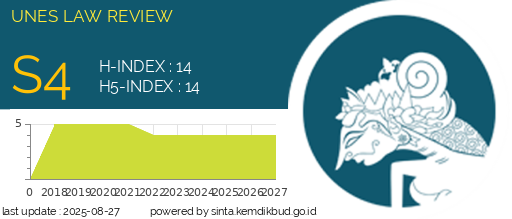Persepsi Mahasiswa Terhadap Pengunduhan Film Secara Ilegal (Studi Pada Mahasiswa Fakultas Hukum Universitas X)
DOI:
https://doi.org/10.31933/unesrev.v6i2.1652Keywords:
Students, Copyright, Illegal DownloadingAbstract
Copyright infringement is often a problem that is difficult to handle properly. One example of copyright problems that are often encountered and difficult to solve is the illegal downloading of films on the internet which proves the rapid development of technology. The more sites that provide this film in circulation, the more films or works are downloaded for free, which is detrimental to the publisher of the work. The illegal accusation in Indonesia has increased along with the times, 63% of internet users in Indonesia who access illegal film sites and in the Hootsuite data, the most internet users are students. As a result of the rampant downloads on this illegal site, it has led to students' perceptions of downloading movies illegally on the internet. This study aims to determine the perceptions of criminal law students towards illegal downloading. This study used a quantitative descriptive approach with a sample size of 50 criminal law students. This study aims to show that students of criminal law know that copyright law and illegal downloading is a violation of copyright tend to agree, but students do not show good action to prevent illegal downloading. Motivation in committing copyright infringement is on his own will and economic factors. As for the perception of the role of the government, students think the government is not good at completing illegal downloads, but students agree that the government helps build a culture and understanding of the community to respect the work of others.
Downloads
References
Eriyanto.2007. Teknik Sampling, Analisa Opini Publik. Yogyakarta: PT LKIS Pelangi Askara
https://apjii.or.id/survei
https://tirto.id/indoxxi akan tutup 1 januari 2020 penyebabnya dari kominfo
Jejen, A., Naulina, R. Y., Wilyadewi, I. I. D. A. Y., Susanti, P. H., & Rosid, A. (2023). Enhancement Financial Literacy of Rural Communities Through Training and Mentoring: Case Study in South Toapaya Village, Toapaya Bintan, Riau Islands. IJCS: International Journal of Community Service, 2(2), 182-196.
Munawar, Akhmad & Taufik Effendy (2016). Upaya Penegakan Hukum Pelanggaran Hak Cipta Menurut Undang-Undang Nomor 28 Tahun 2014 Tentang Hak Cipta. Jurnal. Vol VIII, No.2.
Nadeak, B., Prihantini, P., Jejen, A., Astuti, H. P., Sutiapermana, A., & Handayani, H. (2023). Measure Effectiveness of Reproductive Health Education Programs Teenagers in Schools Intermediate: Evaluation Results in the Cileunyi Region Bandung Regency. International Journal of Community Service, 2(2), 197-210.
Rahayu, Sri. (2016). Persepsi Masyarakat Terhadap Pelanggaran Lalu Lintas Berdasarkan UU Nomor 22 Tahun 2019 Di Desa Bahway Kecamatan Balik Bukit Kabupaten Lampung Barat. Skripsi Fakultas Keguruan dan Ilmu Pendidikan Universitas Lampung
Ruslan, Rusadi. 2013. Metode Penelitian Kriminologi Ed 3. Depok. Fisip UI Press.
Sugiyono. 2010. Metode Penelitian Kuantitatif Kualitatif dan Rd. Bandung:Alfabeta
Undang-Undang Nomor 28 Tahun 2014 Tentang Hak Cipta
Downloads
Published
How to Cite
Issue
Section
License
Hak cipta :
Penulis yang mempublikasikan manuskripnya di jurnal ini menyetujui ketentuan berikut:
- Hak cipta pada setiap artikel adalah milik penulis.
- Penulis mengakui bahwa UNES Law Review berhak menjadi yang pertama menerbitkan dengan lisensi Creative Commons Attribution 4.0 International (Attribution 4.0 International CC BY 4.0) .
- Penulis dapat mengirimkan artikel secara terpisah, mengatur distribusi non-eksklusif manuskrip yang telah diterbitkan dalam jurnal ini ke versi lain (misalnya, dikirim ke repositori institusi penulis, publikasi ke dalam buku, dll.), dengan mengakui bahwa manuskrip telah diterbitkan pertama kali di Jurnal UNES Law Review.



















